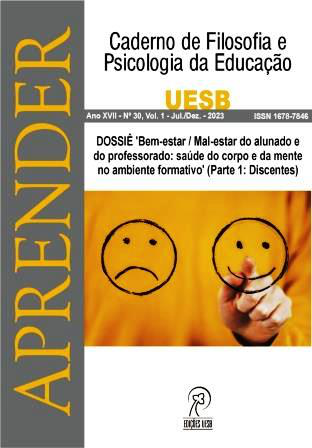The teaching of educational psychology and teacher training: notes on teaching and learning in the classroom in post-pandemic times
DOI:
https://doi.org/10.22481/aprender.i30.13126Keywords:
Educational Psychology, Teacher training, Post-Pandemic, Teaching, LearningAbstract
This essay aims to analyze the challenges of teaching Educational Psychology in teacher training in post-pandemic times. Our research methodology is in the field of Philosophy of Education, in the sense of critically interpreting the training process of future teachers who are in degree courses. We start from the assumption that the displacement of the subject to act in the role of teacher is presented as a result of the relationships that are established in the transmission of critical knowledge in the classroom. This condition constitutes a re-signification of the school culture, in the sense of providing the experience lived in a relationship between equals. We can conclude that Educational Psychology in post-pandemic times should take on the task of re-elaborating teaching and learning the other in the school field as a way of building learning processes in which we can look and think about the world with respect to all kinds of life of our planet in order to avoid the ecological crisis and its devastating consequences.
Downloads
References
ALTHUSSER, Louis. Aparelhos ideológicos de estado. Rio de Janeiro: Graal,1992.
ARENDT, Hannah. Entre o passado e o futuro. Trad. Mauro W. Barbosa. São Paulo: Perpesctiva, 2011.
ARAUJO, Denise Conceição Garcia et al. Percepções sobre o ensino remoto-domiciliar durante o isolamento físico: o que as mães têm a nos relatar? Saúde e Sociedade. v. 31, n. 1. Acessado em: 26 Março 2022, Disponível em: https://doi.org/10.1590/S0104-12902022200877
AUSUBEL, David P. Aquisição e retenção de conhecimentos: Uma perspectiva cognitiva. Trad. Lígia Teopisto. Lisboa: Plátano Edições Técnicas, 2000.
BLACK, Carol. Escolarizando o mundo: o último fardo do homem branco (Schooling the World). EUA/Índia: 2011. 126 minutos.
BRUNER, Jerome. A cultura da educação. Trad. Marcos A. G. Domingues. Porto Alegre: Artmcd Editora, 2001.
GUATTARI, Félix. O inconsciente maquínico e a revolução molecular. In: ________. Revolução Molecular: pulsações políticas do desejo. Trad. Suely Belinha Rolnik. São Paulo: Brasiliense, 1981.
GUATTARI, Félix. As três ecologias. Trad. Maria Cristina F. Bittencourt. Campinas: Papirus, 2009.
LARROSA, Jorge. Pedagogia Profana: danças, piruetas e mascaradas. Trad. Alfredo Veiga-Neto. Belo Horizonte: Autêntica, 2004.
XXX. 2023 – Retirado para não identificar autor.
MASSCHELEIN, Jan & SIMONS, Maarrten. A língua da escola: alienante ou emancipatória. In: LARROSA, Jorge (Org.). Elogio da Escola. Trad. Fernando Coelho. Belo Horizonte: Autêntica, 2021.
PIAGET, Jean.Problemas de Psicologia Genética", tradução de Celia E. A. Di Piero. São Paulo: Abril Cultural, 1974. (Os Pensadores)
RANCIÈRE, Jacques. Préfácio ao Le Philosophe et sés pauvres. In: Revista Rapsódia. Trad. PauloHenrique Fernandes Silveira. São Paulo (USP), N. 11, 2017. Disponível em: https://www.revistas.usp.br/rapsodia/article/view/143784/138428, acessado em: 02 maio. 2022.
XXX. 2007 – Retirado para não identificar autor.
SARTRE, Jean-Paul. Entre quatro paredes. Trad. Alcione Araújo e Pedero Hussak. Rio de Janeieo: Editora Civilização Brasileira, 2007.
SAVIANI, Dermeval. Escola e democracia: teorias da educação, curvatura da vara, onze teses sobre educação e política. 32. ed.- Campinas, SP: Autores Associados, 1999.
SEM AUTOR. Pesquisa do IBGE revela que 4,1 milhões de estudantes da rede pública não tem acesso à internet. In: BRASIL 61. Disponível em: https://brasilpaisdigital.com.br/pesquisa-do-ibge-revela-que-41-milhoes-de-estudantes-da-rede-publica-nao-tem-acesso-a-internet/#:~:text=pa%C3%ADs%20digital%20%2D%20%23BrasilPaisDigital-,Pesquisa%20do%20IBGE%20revela%20que%204%2C1%20milh%C3%B5es%20de%20estudantes,n%C3%A3o%20tem%20acesso%20%C3%A0%20internet&text=Em%202019%2C%20cerca%20de%204,na%20%C3%A1rea%20em%20que%20vivem.
Acessado em 27 fev. 2022.
SEM AUTOR. OMS declara fim da Emergência de Saúde Pública de Importância Internacional referente à COVID-19. In: OPAS. Disponível em: https://www.paho.org/pt/noticias/5-5-2023-oms-declara-fim-da-emergencia-saude-publica-importancia-internacional-referente#:~:text=Bras%C3%ADlia%2C%205%20de%20maio%20de,)%20referente%20%C3%A0%20COVID%2D19. Acessado em: 20 de maio de 2023.
SKINNER, Burrhus Frederic. Contingência do Reforço. Trad. Rachel Moreno. São Paulo: Abril Cultural, 1974.
SILVA, Alzira Karla Araújo da & CORREIA, Anna Elizabeth Galvão Coutinho & LIMA, Izabel França de. O conhecimento e as tecnologias na sociedade da informação. Rev. Interam. Bibliot, Medellín (Colombia) Vol. 33, No. 1 jan-jun de 2010. Disponível em: http://www.scielo.org.co/pdf/rib/v33n1/v33n1a09.pdf Acessado em 25 fev. 2022.
VARELA, Julia. O estatuto do saber pedagógico. In: SILVA, Tomaz Tadeu. (Org.). O sujeito da educação. Rio de Janeiro: Vozes, 1995.
VYGOTSKY, Lev Semenovich. Formação social da mente. Trad. José Cipolla Neto. São Paulo: Martins Fontes, 1988.
Downloads
Published
How to Cite
Issue
Section
License
Copyright (c) 2023 APRENDER - Caderno de Filosofia e Psicologia da Educação

This work is licensed under a Creative Commons Attribution-ShareAlike 4.0 International License.






